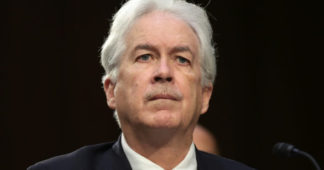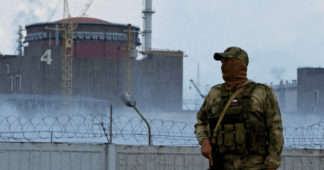By Oct 17, 2022
Ukraine: The Spark for a Nuclear War? One would think it beyond question to state that in any foreign conflict to which the U.S. is a party, the Pentagon and White House would reflexively do two things:
1) set objectives that benefit our country and;
2) have a reasonable chance of success.
It should alarm every American to learn that, unfortunately, Washington’s current strategy related to the Russia-Ukraine War does neither.
In an impromptu visit to the city of Izyum last month after Ukrainian troops had retaken the population center as part of their Kharkiv offensive, President Volodymyr Zelensky said that his troops were marching “towards victory” and that the Ukrainian flag that once again flew in Izyum would soon be flying, “in every Ukrainian city and village.”
Two days later Biden seemed to agree with that objective, telling 60 Minutes that “(w)inning the war in Ukraine is to get Russia out of Ukraine completely and recognizing [Ukrainian] sovereignty.” On Monday in response to a new wave of missiles blasting scores of Ukrainian cities, Biden said the attacks would “only further reinforce our commitment to stand with the people of Ukraine for as long as it takes.”
Biden’s Dangerous Ukraine Strategy
It would appear from context that Biden’s “as long as it takes” vow means the United States will support Ukraine until Ukraine has victory, defined by driving Russia out of all territory – and therein lies America’s strategic problem.
Back in May, CIA Director William Burns said that he thought Putin was “in a frame of mind in which he doesn’t believe he can afford to lose.” Last month, Tobias Ellwood, Chair of the British Parliament’s Defence Select Committee, added that “Putin is now in a corner; this is arguably when he is at his most dangerous.”
Pushing into a corner the man with sole launch authority for a country that possesses the largest nuclear warhead arsenal on the planet is not a wise course of action. Yet that reality is apparently lost on some of the highest officials and retired generals in the West.
In conjunction with his announcement that Russia would unilaterally annex portions of eastern Ukraine, Putin declared he would not hesitate to use nuclear weapons if he believed Russian territory was threatened. The pushback from the West was understandable and immediate. It was not, however, well thought-out.
Former General and CIA Director David Petraeus argued the United States should lead a NATO “effort that would take out every Russian conventional force that we can see and identify on the battlefield in Ukraine and also in Crimea and every ship in the Black Sea.” EU Policy Chief Josep Borrell warned that if Russia ever used nuclear weapons in Ukraine, the collective West would respond with a “powerful answer” with conventional weapons such that “the Russian Army will be annihilated.”
How A Nuclear War Could Start
To underscore the threat to Putin’s rule, the former commander of U.S. Army-Europe, Ben Hodges said that the West should help Ukraine to defeat all Russian troops on Ukrainian territory, including Crimea, saying the “the goal, of course, is the total restoration of Ukrainian sovereignty.” There is a strange and troubling disconnect between the strategic objectives the United States is pursuing and a recognition of what “winning” might produce.
If the enemy under discussion were equivalent to the Taliban, the Iraqi insurgency, ISIS, Qaddafi’s Libya, or al-Shabaab terrorists, then the West could pursue any military objective of their choice (irrespective of the wisdom of such an action) and there would be nothing the opposition could do to prevent the exercise of such a campaign. Western military power might not eventually succeed – as was the case with the Taliban – but as with each of those historical examples, there would never be more than small tactical risks at stake.
What too many of our current leaders and enthusiastic Washington hawks somehow fail to recognize, however, is that unlike all our military opponents of the past several decades, Russia’s possession of nuclear weapons means they can, in a moment of desperation or fear, initiate a nuclear war that could quite literally wipe the United States out of existence.
Let that sink in for a moment.
This should not be hard to understand: if the U.S. and NATO finally provides enough firepower, intelligence, and training to Ukrainian troops that will enable them to physically drive Russian forces completely out of all Ukrainian territory – especially the highly charged emotional areas of Donbas and Crimea – Putin will be forced into a corner where he has to choose between allowing his entire force to be completely defeated or escalate to the use of nuclear weapons
Let me flatly state what should be obvious: there is nothing in the conflict between Russia and Ukraine that is worth the loss of one NATO or American city to a nuclear blast.
Period. Full stop.
This reality should immediately inform a reevaluation of Washington’s policies and the adoption of new objectives. The Constitution places no higher obligation on Congress and the President than to defend our country and protect our ability to prosper as a nation. Courting an avoidable nuclear disaster – especially when our security is not threatened – should never be on the table.
* Now a 1945 Contributing Editor, Daniel L. Davis is a Senior Fellow for Defense Priorities and a former Lt. Col. in the U.S. Army who deployed into combat zones four times. He is the author of “The Eleventh Hour in 2020 America.” Follow him @DanielLDavis.
Also read
Nuclear War Games
We remind our readers that publication of articles on our site does not mean that we agree with what is written. Our policy is to publish anything which we consider of interest, so as to assist our readers in forming their opinions. Sometimes we even publish articles with which we totally disagree, since we believe it is important for our readers to be informed on as wide a spectrum of views as possible.










